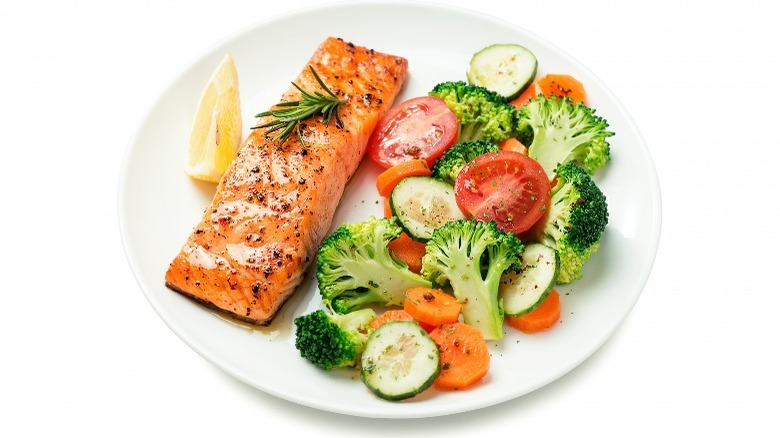Why You Still Feel Hungry Even When You're Eating Healthy
You made a commitment to eat a healthier diet, but it's getting challenging to stick with it because your stomach is always grumbling for more. What gives? It's normal for you to feel a sense of hunger about two hours after a meal, per the Cleveland Clinic, but if you're constantly hungry after you eat, it's time to take a look at what you need to adjust.
One possibility is that you're not getting enough protein. Along with the right balance of carbohydrates and fats, protein is a key macronutrient that helps keep you feeling full. "When you include protein with a complex carbohydrate, it slows down the rate of glucose. This means you'll have a gradual increase and then a gradual decrease, which makes you feel more settled and satisfied," registered dietitian Julia Zumpano, RD, tells the Cleveland Clinic. In other words, if you don't include protein in your diet but eat lots of carbs, this could lead to your sugar spiking and then falling quickly. From there, the tummy growling begins.
The Dietary Guidelines for Americans recommends that you consume roughly 5.5 ounces of protein foods a day, as part of a 2,000-calorie diet. But it's not only a lack of protein in an otherwise healthy diet that could be causing your feelings of hunger.
Make these adjustments to reduce your hunger
While maintaining a low-fat diet can help prevent obesity and other serious health conditions, if you're feeling hungry all the time, it could mean that you are not getting enough healthy fats in your diet.
According to the experts at Healthline, fat requires more time to digest and may also trigger hormones that promote a feeling of fullness. So if you are on a low-fat diet, you may want to see where you may be falling short on nutritious foods with healthy fats. Try adding more omega-3-rich fatty fish such as salmon. Other excellent food sources for healthy fats include walnuts, avocados, full-fat yogurt, olive oil, and eggs.
The experts at Medical News Today also point out that if you are on a low-calorie diet, you may be burning more calories than consuming. This can cause the release of the "hunger hormone" ghrelin, which signals to the body that it needs more food. Also, make sure you are drinking enough water before and after meals to prevent dehydration and promote more of a sense of fullness. And if you are not getting enough sleep, this could also be a cause of your hunger, as sleep is important for maintaining hormone balance.
Addressing these and other factors, such as managing your alcohol consumption and stress levels, could also help address your feelings of hunger. However, if after making these dietary and lifestyle changes you are still feeling hungry, it may be time to consult with your doctor (via Medical News Today).


